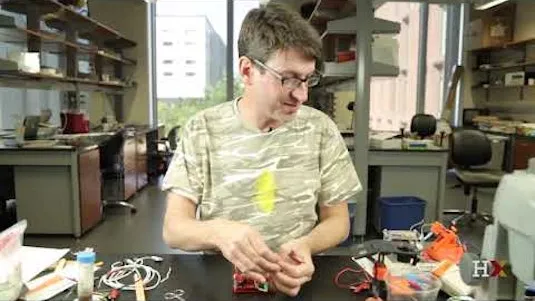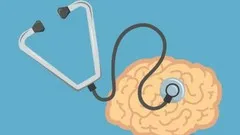
Fundamentals of Neuroscience Part 1: The Electrical Properties of the Neuron 
This course provides an introduction to the fundamentals of neuroscience, focusing on the electrical properties of individual neurons. Through interactive simulations, students will build a neuron piece by piece and learn how to conduct DIY neuroscience experiments. They will also explore Harvard's campus to gain a better understanding of the inner workings of a lab. This course is a great foundation for understanding the function of the entire nervous system. ▼
ADVERTISEMENT
Course Feature
![]() Cost:
Cost:
Free
![]() Provider:
Provider:
Edx
![]() Certificate:
Certificate:
Paid Certification
![]() Language:
Language:
English
![]() Start Date:
Start Date:
17th May, 2023
Course Overview
❗The content presented here is sourced directly from Edx platform. For comprehensive course details, including enrollment information, simply click on the 'Go to class' link on our website.
Updated in [March 06th, 2023]
This course, Fundamentals of Neuroscience Part 1: The Electrical Properties of the Neuron, provides an introduction to the structure and function of the nervous system. Students will explore the inner workings of a single nerve cell and learn how individual neurons use electricity to transmit information. Through interactive simulations, students will build a neuron piece by piece and gain an understanding of the electrical properties in individual neurons. Additionally, students will travel around Harvard's campus to see the inner workings of a lab and learn how to conduct DIY neuroscience experiments. By the end of the course, students will have a foundational understanding of the function of the entire nervous system.
[Applications]
Upon completion of Fundamentals of Neuroscience Part 1: The Electrical Properties of the Neuron, learners can apply their knowledge by conducting DIY neuroscience experiments on their own. They can also use the interactive simulations to build a neuron, piece by piece, and explore the inner workings of a lab. Additionally, learners can use the knowledge gained from this course to build a foundation for understanding the function of the entire nervous system.
[Career Paths]
1. Neuroscientist: Neuroscientists study the structure and function of the nervous system, from the inner workings of a single nerve cell to the complexity of the brain. They use a variety of techniques, such as electrophysiology, imaging, and molecular biology, to understand how neurons communicate and how they are affected by disease. Neuroscientists are in high demand, as the field of neuroscience is rapidly expanding and developing new treatments for neurological disorders.
2. Neuropsychologist: Neuropsychologists specialize in the study of the relationship between the brain and behavior. They use a variety of techniques, such as cognitive testing, to assess and diagnose neurological disorders. Neuropsychologists are increasingly in demand, as the field of neuroscience is growing and developing new treatments for neurological disorders.
3. Neurosurgeon: Neurosurgeons specialize in the diagnosis and treatment of neurological disorders. They use a variety of techniques, such as surgery, to treat neurological disorders. Neurosurgeons are in high demand, as the field of neuroscience is rapidly expanding and developing new treatments for neurological disorders.
4. Neuroengineer: Neuroengineers specialize in the design and development of medical devices and technologies for the diagnosis and treatment of neurological disorders. They use a variety of techniques, such as computer modeling and simulation, to develop new technologies for the diagnosis and treatment of neurological disorders. Neuroengineers are in high demand, as the field of neuroscience is rapidly expanding and developing new treatments for neurological disorders.
[Education Paths]
1. Neuroscience Degree: A neuroscience degree is a great option for those interested in exploring the electrical properties of the neuron. This degree typically covers topics such as neuroanatomy, neurophysiology, neurochemistry, and neuropsychology. Students will also learn about the development of the nervous system, the structure and function of the brain, and the effects of drugs and other substances on the nervous system. As neuroscience continues to advance, this degree is becoming increasingly popular and is expected to continue to grow in the coming years.
2. Cognitive Science Degree: Cognitive science is an interdisciplinary field that combines elements of psychology, neuroscience, linguistics, computer science, and philosophy. This degree focuses on understanding the mental processes that underlie behavior, including perception, attention, memory, decision-making, and language. Students will learn about the structure and function of the brain, as well as the development of cognitive processes. This degree is becoming increasingly popular as the field of cognitive science continues to grow.
3. Biomedical Engineering Degree: Biomedical engineering is a field that combines engineering principles with medical and biological sciences to develop solutions to medical problems. This degree focuses on the design and development of medical devices, such as prosthetics, implants, and medical imaging systems. Students will learn about the electrical properties of the neuron, as well as the design and development of medical devices. This degree is becoming increasingly popular as the field of biomedical engineering continues to grow.
4. Computer Science Degree: Computer science is a field that focuses on the design and development of computer systems and software. This degree covers topics such as algorithms, data structures, programming languages, and computer architecture. Students will learn about the electrical properties of the neuron, as well as the design and development of computer systems and software. This degree is becoming increasingly popular as the field of computer science continues to grow.
Course Provider

Provider Edx's Stats at AZClass
Fundamentals of Neuroscience Part 1: The Electrical Properties of the Neuron introduces the fundamentals of neuroscience, focusing on the electrical properties of individual neurons. Through interactive simulations, students will build neurons one by one and learn how to perform DIY neuroscience experiments. They will also explore the campus of Harvard University to better understand the inner workings of the lab. This course is an important foundation for understanding the function of the entire nervous system. In the first course, you'll learn how individual neurons use electricity to transmit information. You'll build a neuron piece by piece using interactive simulations, then travel the Harvard campus, where you'll see the inner workings of the lab and learn how to perform neuroscience experiments yourself.
Discussion and Reviews
0.0 (Based on 0 reviews)
Explore Similar Online Courses

Youtube Marketing & SEO 2019: Ultimate Youtube Growth Plan

Typographic Logos: Typography and Lettering for Logo Design

Python for Informatics: Exploring Information

Social Network Analysis

Introduction to Systematic Review and Meta-Analysis

The Analytics Edge

DCO042 - Python For Informatics

Causal Diagrams: Draw Your Assumptions Before Your Conclusions

Whole genome sequencing of bacterial genomes - tools and applications

Control Your Subconscious Mind: Neuroscience Hidden Secrets

Perform an Excellent Neurological Bedside Exam

Brain and Behavioral Science Fundamentals
 Related Categories
Related Categories
 Popular Providers
Popular Providers
Quiz
 Submitted Sucessfully
Submitted Sucessfully
1. What is the main focus of Fundamentals of Neuroscience Part 1: The Electrical Properties of the Neuron?
2. What type of experiments will be conducted in this course?
3. What type of tool will be used to build a neuron?
4. What is the purpose of the Fundamentals of Neuroscience Part 1 course?
Correct Answer: To learn how individual neurons use electricity to transmit information.


Start your review of Fundamentals of Neuroscience Part 1: The Electrical Properties of the Neuron